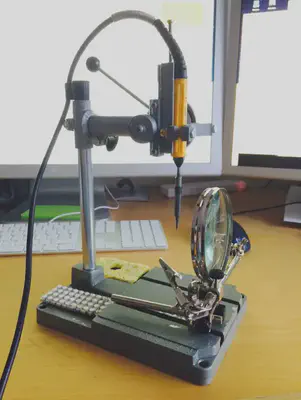Precision Soldering
A significant element of craftsmanship is being a toolsmith to develop tools, asserting individuality against prepackaged, predetermined limitations of provided tools. We created a precision soldering prototype for crafting digital artefacts.

Some consider that craftsmanship embodies the conflict between autonomy and authority. The need to be a free self-determined creator, and the equal need for that creativity to be measured against collectively-agreed upon standards of excellence. This connects craftsmanship to the tradition of upholding standards and taking time, as a source of respect and self-worth. Among those standards are the tools and practices used in crafting.
It has been considered that thinking through the tools we use encourages us to cultivate a form of material consciousness. So, we should consider that to use a machine is to judge its powers, fashion its uses, in light of our limits rather than its potential. We should feel the material specificity of the medium we handle, to appreciate the incompleteness, the possibility, of a design that is not provided by a machine as a fait accompli. Furthermore, asserting our own individuality against the prepackaged, predetermined limitations of the tools we use. Therefore, a significant element of craftsmanship is being a toolsmith to adapt and develop one’s own tools.
We considered precision soldering for crafting digitally enabled artefacts, which necessitated the creation of a prototype precision soldering iron. This was for use in modifying electrical components, beyond a craftsperson’s skill of precision soldering. The prototype was made from combining a soldering iron with a modified drill stand, proving affective for its intended use.